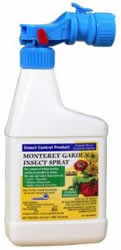Public concern over the use and misuse of pesticides has led increasing numbers of home gardeners to seek means of "natural" pest control. Although some people do not have the time or knowledge to practice all the available alternative methods for controlling pests, there are many cultural practices which will help reduce losses.

Figure 1 - Organic vegetable garden insect control
Soil conditions affect pest populations. Maintain a slightly acid soil (around pH 6.5). Appropriate pH allows vegetable plants to have access to all the necessary soil nutrients and provides a suitable environments for earthworms and microorganisms.
Follow recommended fertilizer practices. Supplement fertilizers with organic material or compost to help assure that all trace elements are available, as well as major nutrients. "Feed" the soil, not just the plants; providing and appropriate environment for all soil life will result in healthier plants which are more resistant to pests and diseases.
Rotate your garden plot, if you can. Use related crops in one site only once every three or four years.
Use inter-plantings as opposed to solid plantings of a crop. This can slow the spread of diseases and pests, giving you more time to deal with them.
Thin young plants to a proper standard. Overcrowding causes weak growth and subsequent insect and disease problems.
Keep down weeds and grass. They often harbor pests and compete for nutrients and water.
Use a mulch to reduce soil splash, which brings soil borne diseases into contact with lower leaves.
Water in the morning so that plants have time to dry before the cool evening. Drip irrigation prevents foliage from getting wet at all when watering. For plants susceptible to fungus infections leave extra space between them to allow for good air flow; orient rows so that prevailing winds will help foliage dry quickly after a rain or watering.
Select disease-resistant varieties and plant crops that are suited to the soil and climate. If you do plant vegetables or fruits that are not normally grown in your area, do your best to provide necessary conditions. Use certified seed and plants if available.
Remove infected leaves from diseased plants as soon as you observe them. Dispose of severely diseased plants before they contaminate others. Clean up crop refuse as soon as you are finished harvesting.
Time plantings in such a way that the majority of your crop will avoid the peak of insect infestations. Keep a record of the dates and conditions under which disease and insect problems occur.
Take advantage of the biological control already taking place in your garden by encouraging natural predators. Learn to recognize the eggs and larvae of the beneficial insects and avoid harming them.
The most effective and most important of all practices is to observe what is going on in the garden. Many serious disease or insect problems can be halted or slowed down early by the gardener who knows what to look for and regularly visits the garden for the purpose of trouble-shooting.
